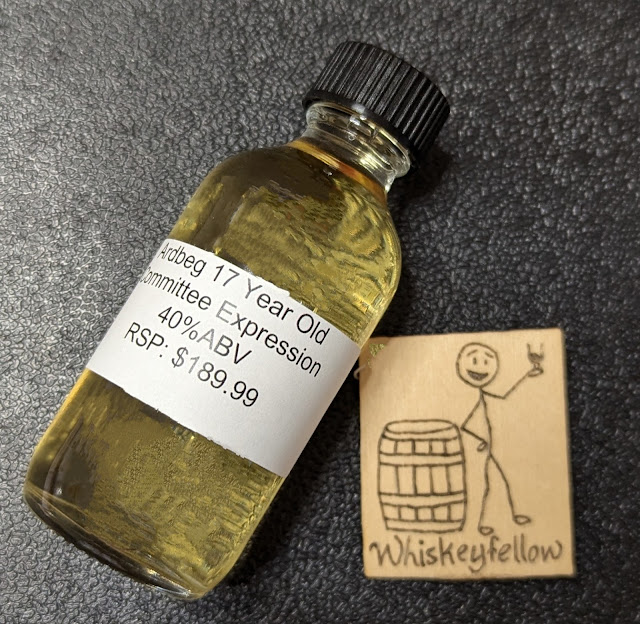The
tiny Scottish island of Islay is home to about 3000 people, yet is home to ten
working distilleries making some of the peatiest whiskies in the world. They
are Ardnahoe, Bowmore, Bruichladdich, Bunnahabhain, Caol Ila, Kilchoman, Lagavulin, Laphroaig, and Port
Ellen, which only reopened this past March
after 41 years.
The
tenth is Ardbeg, situated on Islay’s southern coast and founded in
1815 by John Macdougal. In 1838, he sold it to Thomas Buchanan;
however, John’s son, Alexander, continued to run operations. Alexander died in
1853, and his sisters, Margaret and Flora, assumed control, along with Colin Hay.
Margaret and Flora are one of the earliest female Scotch distillers on record;
the first was Helen
Cumming, who founded Cardhu
in 1824.
Ownership
returned to the Macdougals when, in 1922, Alexander Macdougal & Co.
purchased Ardbeg in its entirety. Then, in 1977, Hiram Walker acquired it only to
shutter the distillery in 1981 due to minuscule demand. Its closure severely
impacted the local economy, as while it only employed 18 people, the town
relied heavily on the distillery.
In
1987, Hiram Walker was sold to Allied
Lyons, and in 1989, the distillery rose from the
ashes, only to be mothballed again two years later. In 1997, The Glenmorangie Company purchased Ardbeg, its current owner.
Ardbeg
offers something called a Committee Release of some of its whiskies.
What does that mean? I’m glad you asked! In simple terms, the Ardbeg Committee is the distillery’s official fan club. You can enroll
for free; you will receive regular email newsletters and special whisky
offerings. You can become a Committee member by visiting its website.
Ardbeg 17
Years Old was a once popular single malt Scotch
released in 1997 and discontinued in 2004. A revived, limited release was made available
this past September and is only available for Committee members. It harkens
back to a quarter century ago when Ardbeg still used chill filtration and
packaged its whisky at 40% ABV (80°). Ardbeg doesn’t do that anymore – except with
this resurrected Scotch to make it an authentic rendition. Ardbeg 17 Years Old was
aged exclusively in former Bourbon casks.
“When we meet die-hard Ardbeg Committee members, the conversation often turns to Ardbeg 17 Years Old. After pondering for some time how we could bring this favourite back to life, we landed on a delicious recipe that honours the original 17-year-old’s character in aroma, flavour and texture.” – Gillian Macdonald, Master Blender
So,
if you’re a Committee member, it has a suggested price of $189.99. If you’re not,
you’ll have to wait for an auction or purchase on the black market.1
Thankfully, Ardbeg sent me a sample of the Ardbeg 17 Committee Release in exchange
for my no-strings-attached, honest review. Let’s #DrinkCurious and see how
things turn out!
Appearance: I
poured Ardbeg 17 Years Old into my Glencairn glass to sip neat. The whisky was the
color of pale straw. A bold rim formed, discharging thick, slowly crawling
tears.
Nose: As I poured
the liquid into my glass, a big, bold aroma of peat filled the air. It
continued as I allowed the whisky to breathe. Once I brought the glass under my
nostrils, I smelled brine, oak, vanilla, and pears. There was also a very minute
latex quality. When I drew that air through my lips, I encountered salted
pears.
Palate: The
mouthfeel was thick and creamy. The smoky peat was far milder than I
anticipated. The second sip thinned the texture, yet it remained creamy. Aside
from the peat, the front included salted caramel. My mid-palate found mineral
water (almost Perrier-like), pears, and a rubber tinge. The back tasted
of oak, mocha, and fennel.
Finish: Flavors
of fennel, oak, sweeter peat, and salted caramel combined with mineral water, producing
a steady, incredibly long duration of 3:22.
Bottle, Bar, or Bust: If I
had to choose one Islay distillery to drink for the remainder of my life, I’d select
Ardbeg. It consistently delivers excellent whiskies (although there is an
occasional meh release). Ardbeg 17 Years Old is way different from any
Ardbeg I’ve had before (likely due to the proof and chill filtration). Ardbeg
is known for its peat bombs, and Ardbeg 17 Years Old is somewhat tame.
Yet, for whatever reason, all
of that quirkiness works. The Ardbeg magic remained. The minerality took me by surprise.
The rubbery note is usually a turn-off for me; however, it seemed almost
complimentary. That freight train finish was unstoppable before falling off a
cliff.
Some folks may scoff at
paying $190.00 for an 80° Scotch. Good! That means there’s more available for
everyone else. Bite the bullet, spend the money, and grab a Bottle if
you can find it because this one is a stunner. Cheers!
My Simple, Easy-to-Understand
Rating System
- Bottle = Buy It
- Bar = Try It
- Bust = Leave It
1 Most enthusiasts refer to the black market as the secondary market. I expect and practice transparency and choose to be blunt. There are limited legal opportunities to purchase distilled spirits other than from a licensed retailer. When you buy from strangers off the Internet, you risk getting ripped off, either by not receiving anything or receiving counterfeit merchandise. That’s a big business for scammers, and there are stories nearly every day in whisky groups about someone complaining of a deal that has gone bad. I believe it isn’t worth the risk, and I recommend not participating.
Whiskeyfellow encourages
you to enjoy your whiskey as you see fit but begs you to do so responsibly.

Comments
Post a Comment
As we should drink in moderation, all comments are subject to it. Cheers!